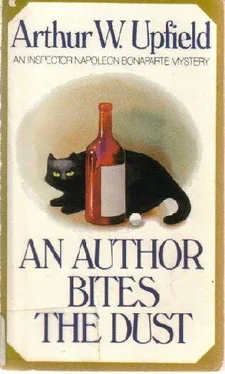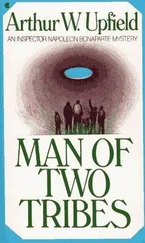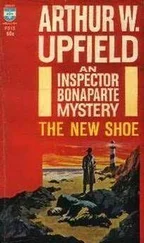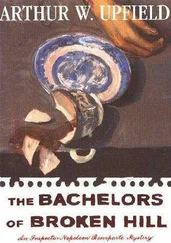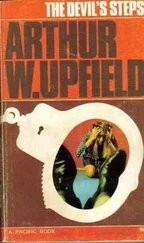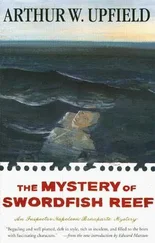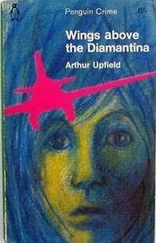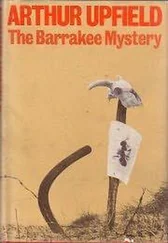Arthur Upfield - An Author Bites the Dust
Здесь есть возможность читать онлайн «Arthur Upfield - An Author Bites the Dust» весь текст электронной книги совершенно бесплатно (целиком полную версию без сокращений). В некоторых случаях можно слушать аудио, скачать через торрент в формате fb2 и присутствует краткое содержание. Жанр: Классический детектив, на английском языке. Описание произведения, (предисловие) а так же отзывы посетителей доступны на портале библиотеки ЛибКат.
- Название:An Author Bites the Dust
- Автор:
- Жанр:
- Год:неизвестен
- ISBN:нет данных
- Рейтинг книги:5 / 5. Голосов: 1
-
Избранное:Добавить в избранное
- Отзывы:
-
Ваша оценка:
- 100
- 1
- 2
- 3
- 4
- 5
An Author Bites the Dust: краткое содержание, описание и аннотация
Предлагаем к чтению аннотацию, описание, краткое содержание или предисловие (зависит от того, что написал сам автор книги «An Author Bites the Dust»). Если вы не нашли необходимую информацию о книге — напишите в комментариях, мы постараемся отыскать её.
An Author Bites the Dust — читать онлайн бесплатно полную книгу (весь текст) целиком
Ниже представлен текст книги, разбитый по страницам. Система сохранения места последней прочитанной страницы, позволяет с удобством читать онлайн бесплатно книгу «An Author Bites the Dust», без необходимости каждый раз заново искать на чём Вы остановились. Поставьте закладку, и сможете в любой момент перейти на страницу, на которой закончили чтение.
Интервал:
Закладка:
His gaze dropped to his food. Of what he was thinking she could not guess, but she was sure he was not seeking an advantage. For a full minute neither spoke. Then he was looking at her as no man ever had regarded her. In another it would have been an insult. His bright blue eyes began with an examination of her clothes, and continued with an examination of feature by feature until finally they gazed with penetrating steadiness into her own eyes.
He said, “Are you prepared to give me your full confidence and be satisfied with only a portion of mine?”
She nodded, and he asked, “When shall we begin?”
“Now, if you like.”
“Very well. Why are you so sure that Mervyn Blake was murdered?”
“I don’t know why. I can’t tell you.”
“Do you know of a probable motive for killing him?”
She shook her head.
“You must not be offended if I throw your words back to you,” he warned. “You said just now that Blake wanted the rewards but did not like the work that earned them. Will you enlarge on that?”
“I didn’t say that he disliked the work of writing,” Nancy asserted. “He liked it well enough, but it took second place to the ambition to be famous. He wasn’t the great man a number of people thought he was, and he knew it. He had in high degree the gift of word painting, and in low degree the gift of telling a story. The division of those two gifts is even greater in Wilcannia-Smythe, but he is more accomplished in deluding himself.”
“I confess that I don’t see where this affair begins and where it ends,” Bony said. “I find myself unable to make a reasonably accurate assessment of the importance of these people. I am very feminine in my gift of intuition, and I have felt, and still do, that the motive for killing Blake, if he was murdered, lies somewhere in a distinction between what is termed literature and commercial fiction. Bagshott may have thrown me out of gear. On the other hand, he might very well have pointed out the track for me to follow. Am I right in assuming that a great novelist has in high degree the gift of story-telling added to the gift of word painting?”
“Yes-and the gift of taking pains.”
“Apply your measure to I. R. Watts.”
“He can paint word pictures and tell a story, but he lacks the gift of taking pains.”
“And Clarence B. Bagshott?”
“Bagshott is a born story-teller, but he lacks the gift of taking pains with his word painting. He is too slipshod ever to become a great novelist. But a story teller-he is certainly that.”
“Was Blake conscious ofhis own limitations?”
“I think he was. You see, he must have realized that when his books were refused publication in London and America they were not-well, good enough.”
“Go on, please.”
“I know this much about Mervyn Blake,” she said. “When he could not publish overseas, he strove to exert his influence on Australian literature so that he would secure an undying place in it. Long ago he and Wilcannia-Smythe planned it all. Fitted only to be flunkeys at the Court of World Literature, they decided it would be preferable to be joint dictators of the local Court of Literature.”
“What influence did they exert on Australian literature?”
“Actually very little. They tried to lead it. No one can do that. A nation’s literature goes on and up or on and down in accordance with the mental virility of its writers.”
“Was there, or rather, is there a great deal of what is termed back-slapping going on among author-critics?”
“Quite a lot, but, as Abe Lincoln said, you can’t fool all the people all the time, and in the long run it doesn’t do them any good. They have news value, not because they are authors but because they succeed in having themselves elected office bearers in literary societies. They don’t influence the unbiased critic.”
“Thank you, Nan. We are getting along very nicely.”
“I thought we could move once we got started, Bony.”
“Of course. Let’s attack the problem from a different angle. Was there any other woman in love with Mervyn Blake?”
“Ella Montrose was very fond of him. But-”
“Don’t think it. Was any other man in love with Mrs Blake?”
“Little Twyford Arundal worshipped her from a distance,” Nancy replied. “I think that Martin Lubers liked her.”
“Only liked her?”
“That is all, I think.”
“I have read the record of what occurred that last afternoon and evening of Blake’s life as set down by you. Did you forget anything when you made your statement?”
“No. InspectorSnooks saw to that.”
“Was Blake interested in women?”
“I don’t think so. He liked me. Liked me; no passion.”
“What about his private life? His relations with his wife?”
“Quite normal, I believe. She scolded him sometimes for drinking too much. I fancy they got along very well. They lived to a great extent independently, and they worked independently, though for the same end.”
“In their objective, therefore, they were united?”
“Yes, they were.”
“Tired of being questioned?”
“No, Bony, I’m not.”
“I would like to ask more personal questions.”
“Do so. Have you a cigarette?”
“Of course. Forgive me, please.” Having held a match to her cigarette, he said, “What was your interpretation of the meeting of Wilcannia-Smythe and Mrs Blake at the Rialto Hotel?”
“I don’t know what to think about that,” she confessed. “It seems that Mrs Blake found Wilcannia-Smythe’s handkerchief and accused him of leaving it somewhere or other. I don’t understand it at all.”
“Why did you leave without speaking to Mrs Blake?”
Nancy Chesterfield hesitated, and Bony was sure she was marshalling her facts.
“In the first place, I was furiously angry when Wilcannia-Smythe did not return to me, and in the second place, I felt that Mrs Blake was in such an emotional state that she would not appreciate it if I spoke to her.”
“She has a temper?”
“Yes. Also she has a forceful personality.”
“That night you spent with theBlakes, you slept in Mrs Blake’s room. Where did she sleep?”
“In the dressing-room, next to it.”
“And where did Mrs Montrose sleep?”
“In the room beyond the dressing-room. The dressing-room served both bedrooms.”
“You met otheroversea visitors at the Blake’s beside the man Marshall Ellis, did you not?”
“How did you know that? Yes, I did. Janet Blake has always been keen to entertain foreign literary people. Her correspondence with literary people in other countries is very large.”
“What was your impression of Dr Chaparral?”
“Good! I liked him. He could talk well and always interestingly.”
“He played ping-pong exceptionally well, I understand.”
“He held the South American Championship for three years running.”
“And he was almost an expert on the customs and superstitions of the backward peoples of his country, was he not?”
“Yes, he knew a great deal about them.”
“And as he told his stories, Ella Montrose jotted them down?”
Nancy Chesterfield frowned and regarded Bony with narrowed eyes. She nodded, and Bony pressed on, “What did she write on, do you remember?”
“Yes,” she said. “Ella started off by making memos of the doctor’s stories on pieces of paper and then either rewrote them in a note-book, or left it to Blake to do. Some of them were extraordinary stories, and terribly gruesome.”
“Did the note-book have a black cover?”
“It certainly did. How do you know all this?”
“Intuition.”
“Fibber.”
“You are correct. Thank you very much for taking me to lunch. It has been much better than if I had taken you. May I call on you at your office-when I want to?”
Читать дальшеИнтервал:
Закладка:
Похожие книги на «An Author Bites the Dust»
Представляем Вашему вниманию похожие книги на «An Author Bites the Dust» списком для выбора. Мы отобрали схожую по названию и смыслу литературу в надежде предоставить читателям больше вариантов отыскать новые, интересные, ещё непрочитанные произведения.
Обсуждение, отзывы о книге «An Author Bites the Dust» и просто собственные мнения читателей. Оставьте ваши комментарии, напишите, что Вы думаете о произведении, его смысле или главных героях. Укажите что конкретно понравилось, а что нет, и почему Вы так считаете.
